Mozambique - Escalating violence and displacement (DG ECHO, UN OCHA, IOM) (ECHO Daily Flash of 1 ...
Mozambique: Cabo Delgado, IDPs & resettlement, Covid-19 rise – By Joseph Hanlon
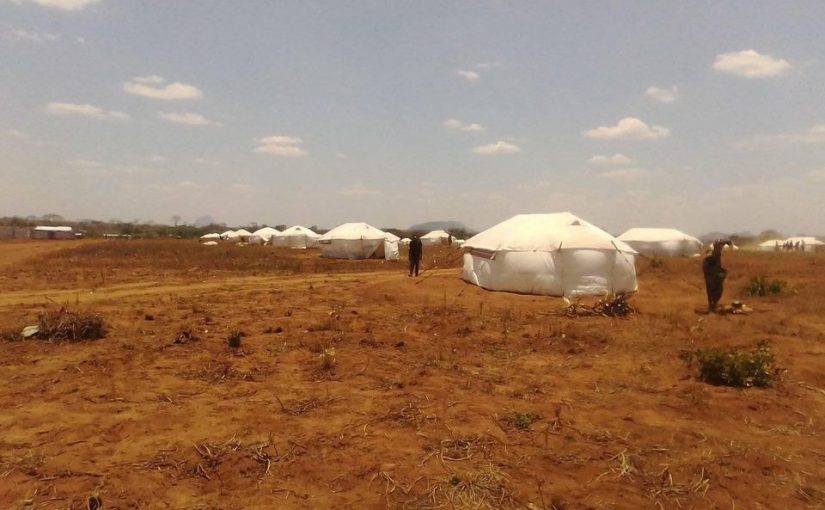
Corrane, Nampula ptovinde. [File photo: Noticias]
Cabo Delgado
- Total stops work at Afungi
“Total has suspended all construction work at its LNG project on the Afungi peninsula in Cabo Delgado, following a spate of violent incidents close to the LNG site,” reports Zitamar. (4 Jan) A new outbreak of Covid-19 in the workforce also contributed to the halt. (Carta de Mocambique 4 Jan) It appears the halt is long term. Its official statement says, “in view of the evolving security situation in Cabo Delgado province and Palma district, Total … has decided to reduce the staff present at the project site in Afungi” and it is dismissing workers. (Carta de Mocambique 5 Jan; Lusa 4 Jan) About 500 workers have been evacuated from Afungi so far. (MediaFax 4 Jan)
There was fighting between the defence forces (FDS) and insurgents in the village of Quitunda, where Total is relocating communities from other parts of its land concession. Bloomberg (3 Jan) says “the fighting in Quitunda is the closest yet to Total’s construction camp,” and is less than 1 km from the airstrip. The fighting in Quitunda is the first within the concession (DUAT) area, but outside the fence around the airstrip, port, and industrial area. Bloomberg says the skirmish occurred on Friday evening (1 Jan) and fighting continued until Saturday, when government forces expelled the insurgents. Our map of recent fighting near Afungi is on http://bit.ly/Moz-Afungi-Jan21
Comment
Government panic over Total halt
With ExxonMobil now unlikely to go ahead with its gas project due to lower projected gas demand than expected and due to the worsening security situation in Cabo Delgado, government now fears that Total is having second thoughts and that its halt could be long term or permanent, using Covid-19 and security as excuses.
The government of President Filipe Nyusi increasingly speaks through social media proxies. It uses the private defesamoz website for claims of victory and other statements, rather than official websites of the ministries of interior and defence. And a group of praise singers, of whom the most prominent is Egidio Vaz, is used to attack critics and say the things ministers feel they cannot say. In a way, it is no different than European or US ministers giving confidential briefings to trusted journalists.
Vaz on Sunday (3 Jan) made public the fears that Total is having second thoughts: “Lately Total has been sending out announcements justifying delays in the implementation of the gas project. First it was due to Covid-19. Now it claims the safety issue. … My sources, which are military and security on the ground, suggest that the Foreign Media + Total consortium intends, with this type of alarmist and unfounded news, to justify any delay in the implementation of the project.” https://www.facebook.com/egidiovaz/
Vaz also quotes fellow praise singer Juliao Arnaldo, blogging as Lenon Arnaldo, to call me and Carta de Mocambique editor Marcelo Mosse “the faces of fake news”. Vaz e-mailed me to say “There was no attack on Jan 1st in Quitunda.” But he quotes Arnaldo to say “from 23 until 31 December 31, the FDS [defence forces] managed to repel and abort several attempted attacks or assaults on the Palma district, in particular, the Total logistical platform area. … There were attempted attacks or assaults on Palma, but the same found firm response from the FDS.” And Cabo Delgado police spokesperson Ernesto Madungue confirmed a shoot-out in Quituda on 1 January in which one insurgent was killed and one police person was injured. (O Pais 5 Jan)
Two decades ago Mosse was deputy to Carlos Cardoso on Metical and with Carta he has continued in the Cardoso tradition. The attack on Mosse is probably because on Monday (4 Jan) he not only confirmed the view that “Total’s decision to evacuate … is an indicator that gas exploitation is being delayed”, but also because he called for a halt to the entire gas project. “The exploitation of gas in the present conditions does not serve the Mozambicans.”
Carta uses the Pinnacle News photo also published here on 3 Jan of the floating hotel stuck in Pemba harbour. “Instead of building a solid camp, using our stone and sand, Total ordered prefabs from Europe. Our ‘local content’ is simply to see these residential modules arrive by ship. If this regime cannot impose local content and end this war, then let’s stop the gas. This war seems to be an instrument of plunder. External and internal looting.”
And he raises the land grab issue. “We have about 500,000 displaced people pushed into remote districts as far away as Zambezia. Why? And there they are treated as foreigners, exiled. And when the war is over, will their land have been taken?”
Missing since 7 April is Ibraimo Mbaruco, a reporter for Radio Comunitaria de Palma. In his last message, he said he was “surrounded by military”. Sometimes, threats by the praise singers are backed up by action.
- Total claims local content ‘achievements’ but community leaders disagree
“Some of this year’s key achievements include development of tools to increase visibility of upcoming opportunities, … improving stakeholder engagement and the implementation of process to support project day to day local content maximization activities and improving overall communication,” reported Total in a 23 December press release on its Local Contest Technical Committee. https://www.mzlng.total.com/en/local-content
“Lutar por Cabo Delgado” Facebook page (27 Dec) asked “Which bodies have been created that include community leaders and citizens? Do Total, Videsh or any other company involved – including Mozambican entities – have a plan for including peasants and fisherfolk, community opinions, and any evaluation of their work and their relationship with the companies?”
Total says its “direct local spend” has been more than $950 mn, but of that only $230 mn is with 190 Mozambican-owned companies. “The project workforce is currently 83% Mozambican, of which 24% come from the district of Palma.” Total has trained 34 young Mozambicans in “high-end technologies”.
Drilling will resume for ENI’s floating LNG plant this month, with the drilling ship arriving in Pemba today, the Instituto Nacional de Petroleo announced on 4 January. It said the drilling had started in September 2019 but was stopped in April 2020 due to Covid-19. The drilling is for wells to provide gas for the floating LNG platform in the farthest off shore part of the gas field. Production should start next year. ENI has no onshore facilities, so is not affected by security problems.
IDPs and Resettlement
- Has everyone in war zone fled?
There are more refugees than the entire population of the five war affected districts. The UN Food and Agriculture Organisation estimates that there are 560,000 internally displaced people (IDPs) because of the war. UN OCHA’s latest access map https://bit.ly/Moz-CDg-access-Nov20 shows five districts seriously affected (Palma, Mocimboa da Praia, Muidumbe, Macomia and Quissanga) which have a population of 510,000. This suggests nearly everyone has fled the war zone.
Meanwhile the government’s policy of effectively clearing problem districts of people and resettling then far away, hopefully with donor money, is becoming clearer. At least 2100 people have been moved to Corane, in the south of Nampula province, 450 km from homes in the war zone. They have been given tents, and a very basic food ration, and are now expected to build their own houses. But it appears most families would like to eventually go “home” to Cabo Delgado. (O Pais 15 Dec)
- Will the donors pay?
ADIN (Agencia de Desenvolvimento do Norte, Northern Development Agency) was established in March and given the task of providing humanitarian assistance and assuring temporary or permanent relocation by President Filipe Nyusi, in a speech in Pemba in August. It is headed by one of the most powerful men in government, Agriculture etc Minister Celso Correia, who seemed the only person who might be able to deal with the Cabo Delgado oligarchs and get some resources to the IDPs. But nothing has been heard of ADIN since them.
@Verdade (10 Dec) revealed that there is no money in the 2021 state budget for ADIN. Like Correia’s largely World Bank funded Sustenta, this allows him to manage the budget without reference to parliament or formal government checks. The US has promised $42 mn and the African Development Bank $60 mn. ADIN’s budget for 2021 is $764 mn, which means Correia must be hoping to get the remaining $662 mn from the World Bank, which has supported him generously.
An estimated 90% of IDPs are staying with friends and family in Pemba, Mueda, Montepuez, and elsewhere, and not in camps. But the rains are starting, making support for IDPs more difficult, for the next three months at least.
‘Trying to survive a three-year nightmare in Mozambique’ is a good report by Caroline Gaudron, strategic support manager for MSF in Mozambique, on the plight of IDPs who flee, leaving everything behind, and walk for days to safety. “After all this suffering, the displaced people finally reach their destination to find, most of the time, total destitution and misery.” MSF had been running clinics in the war zones, but has been largely forced out. She ends by calling on “the Mozambican government to facilitate the response of international humanitarian organisations before it is too late.” A gentle way to say humanitarian organisations are still failing to gain access to Cabo Delgado. https://www.msf.org/displaced-violence-trying-stay-alive-mozambique
Comment
- Quissanga – a wasted opportunity to show an alternative
IDPs from Quissanga can return home, according to police chief Bernardino Rafael. Insurgents are no longer active in that area, he said. But he admitted that it would be a “challenge”. “The truth is, terrorism is there, and we have to confront it.” (RM & DW 5 Dec, Zitamar 11 Dec) And the police head offered no assistance or promises of security – and there was no follow up from government. It is a wasted opportunity.
Quissanga is the southernmost district to be captured by the insurgents and the district town, Quissanga, as well as Bilibiza, were largely destroyed. The fighting has now moved north. but insurgents are still active on the edges of Quissanga, along the coast to the east and near the N380 road at the west. So any returnees will need protection – by soldiers who will not harass them and demand bribes.
Rafael estimated that 45,000 people have fled Quissanga, many to crowded IDP camps in Metuge, which is across the bay from Pemba and just 60 km south of Quissanga. Easy to reach by road, possible to defend. Rebuilding Quissanga could create jobs and demonstrate to young people there is an alternative to the insurgents.
The first jobs could go to local young people who want to return home. They would be largely clearing the destruction and cleaning up. Some skilled builders could be hired to train young people to do the rebuilding. Several NGOs have skills training programmes. This could be linked to literacy and numeracy training. Many more jobs could be created, planting trees, creating irrigation systems, etc. Help could be provided for local people to start or re-establish businesses.
Of course, in Mozambique, one must deal with the party and corruption. It would be better to formalise this – say that, perhaps, 20% of people for jobs could be allocated by Frelimo. And set some kind of open criteria for the others – education, willingness to work long days and build their own houses, etc. Young people would be paid at least the minimum wage, and perhaps their superiors could be given bonuses for actually handing over the money.
An agency like ADIN, in cooperation with the police, could organise this. Simply re-occupying Quissanga could create thousands of jobs. Phone messages would fly across the province – there is an alterative to the insurgents.
Sadly, this seems impossible. The oligarchs and party officials and local police and others would demand to eat most of the money, and there would be huge competition for a share. How much would reach young people returning to Quissanga? But again, if it succeeded, it would send a message – Sharia is not the only way to combat greed and corruption.
Is Quissanga a lost opportunity to win back the youth and show them an alternative future? Perhaps it is not too late. jh
- Gemstones: another lost opportunity
A trader was arrested in Eratu, Nampula, with 780 kg of tourmaline which he had bought from artisanal miners (garimpeiros), because he did not have a licence to trade in gemstones. (Carta de Mocambique 30 Dec) For decades, thousands of Mozambicans have earned a precarious living mining gemstones in Nampula, Cabo Delgado, and Niassa. In turn they supported many traders selling food and equipment and buying the stones. It is largely informal, with stones eventually sold to foreign buyers who pay less than the value and smuggle the stones out of the country. But a lot of people earn a meagre living.
In many countries, this has been institutionalised, with state agencies buying the stones, as well as gold, at a higher price and still making a profit for government. The agency usually licences local buyers who can buy stones because they pay more. The agency often provides health and safety training and equipment, to limit dangerous and environmentally damaging practices. And everyone gains – the miners and the state both earn more.
But this opportunity to support local communities has been thrown away, because Mozambique decided that gemstones should be concentrated in the hands of big companies with Frelimo party connections. When Montepuez Ruby Mining (MRM) took over the ruby trade and 34,000 ha a decade ago, it forced thousands of miners and farmers off the land. Some joined the insurgency. And MRM continues to battle with desperate garimpeiros.
And there is a steady consolidation of gold and gemstone production, and even small scale trading is controlled by the party. The Mozambican oligarchs and foreign companies are the big winners, and poor people are squeezed out of yet another way to earn enough to buy food. Another lost opportunity.
Gains for gold miner: The Australian miner Intra Energy saw its share price nearly double at the end of December when it announced “potentially substantial gold discovery” in its Minas do Lurio Gold project. Intra Energy has a coal mine in Tanzania and controls Intrafrican which is based in the tax haven Mauritius which in turn owns 95% of Minas do Lurio which has a prospecting licence for 17,000 ha along both sides of 35 km of the Lurio River, the border between Cabo Delgado and Nampula. Its prospectus notes that there are already artisanal miners working in the area. https://bit.ly/3hHsxYN They will surely be displaced, along with local villages. There will be dredging along the river. The gold will be refined in Mauritius, not Mozambique.
Minas do Lurio has a complex history. It was set up Winston Theler – son of German princess Loretta von Sayn-Wittgenstein-Hohenstein and Spanish hotel magnate Juan Ramon Theler, and who arrived in Cabo Delgado in 2014 – and his wife, the German Countess Benedicta von Schall-Riaucour. The prospecting licence was granted in May 2017. In August 2018, 5% of Minas do Lurio shares were sold to Pemba lawyer and businessman Casimiro Filipe Chelele. In Cabo Delgado, it is clearly essential to have a local partner. In June 2019 IntraAfrica took a large stake in the project through Mauritian companies. On Linkedin, Theler lists himself as owner and manager of Minas do Lurio. The prospectus lists Theler as Chief Operating Officer and Schall-Riacour as Chief Administrative Office.
Covid-19
- Sharp rise in cases, but numbers remain low
After remaining stable for two months, in the past week the number of new Covid-19 cases (averaged across 7 days) has rising dramatically, from 103 per day on December 30 to 151 today (5 Jan). Deaths are still averaging one per day. Total cases have reached 19,542 and there have been 171 deaths.
By contrast, neighbouring South Africa passed 1 million cases of Covid-19 on 27 December. By that date 26,735 people had died of Covid-19. South Arica is a country of 60 million people, just double the size of Mozambique, but with 150 times as many deaths.
South Africa has a new and much more contagious variant and cases are doubling ever two weeks. The concern is that if the new variant reaches Mozambique, it could have a serious impact. South Africa closed all its beaches, while Mozambique opened its borders to visitors with no-Covid test certificates – hoping to boost the local tourism business. And Carta de Mocambique (4 Jan) reports that during the festive season, hotel and tour operators saw a reasonable level of clients, above what has been happening during the Covid-19 crisis.
The National Health Institute reported today that there are 80 people hospitalised, of which 62 are in Maputo. There are 2,298 active cases of Covid-19, nearly all in Maputo city (1,570) and province (272, mostly Matola). Next comes Cabo Delgado (102) where there had apparently been an outbreak among Total workers at Afungi. This is followed by Sofala 83, Niassa 77, Nampula 71, Tete 43, Gaza 37, Zambezia 29, Manica 14, and Inhambane 0.
Zimbabwe announced a strict lockdown on 2 January as it faces a second wave. Everyone is urged to stay at home. In the last week, there have been a further 1342 cases, raising the total of 15,829 recorded. Last week there were a further 29 deaths too, including a number of high profile business people and politicians, bringing the total to 384 dead. Zimbabwe’s population is 15 million, half of Mozambique, but it has double the number of Covid-19 deaths.
“Zimbabwe like many other African countries outside South Africa and to some extent Nigeria, has been relatively spared the ravages of COVID-19 to date. The total (reported) cases and deaths remain low,” notes Ian Scoones in his excellent Zimbabweland blog. https://zimbabweland.wordpress.com/
The spatial pattern of cases also gives some clues. Cases of Covid-19 in Zimbabwe are “heavily concentrated in the larger urban centres, where poorer people live in crowded places and moving to jobs means travelling on crowded transport,” notes Scoones. “The other foci of infection are on the borders, highlighting the impact of migration as a spreader of disease, especially from South Africa. … However, there still remain very few (recorded) COVID-19 cases in any of our rural study areas, and few stories about people who have died. This is the case across the country.” The situation in Mozambique seems to be very similar, with cases and dealths mainly urban..
Health workers are selling fake Covid-19 negative test certificates, signed and stamped by the National Institute of Health, for $40-45. (Carta de Mocambique 31 Dec)
Turkish spying confirmed
A new document confirms reports of Turkish diplomatic spying in Maputo on members of the opposition Gülen movement published in January 2017, just after the visit to Maputo on 24 January 2017 of Turkish president Recep Tayyip Erdogan and a large 150 member delegation. (Carta de Mocambique 24 Jan 2017; this newsletter 356, 29 Jan 2017)
Nordic Monitor, a Sweden-based, Turkey-focused investigative journalism project published a confidential intelligence cable dated 16 September 2016 from Aylin Taşhan, Turkey’s first ambassador to Mozambique. In December 2016 she became general director of the Turkish foreign ministry intelligence section, where she continued to run large-scale spying activities using Turkish embassies. The document listed the names of 32 Turkish individuals and their companies in Mozambique, including DECO Construction Limitada, Turkmall Limitada, Isparta Construction Limitada, Willow International School Lda and NGO Ilhas da Paz. http://bit.ly/3pNdrDH
Erdogan’s visit did not well. He brought a big delegation and promised much-needed investment in exchange for a crack down on Gülen supporters, notably on Willow International Schools, a global network, and the extradition of Turkish businessman Mehmet Ali Coban. http://bit.ly/38hwz7b Willow secondary schools are the best in Maputo and are attended by the children of the elete; locally-based Turkish companies were important investors in the then building boom with links to some in the local nomenklatura. Erdogan’s offer was refused and he was sent away with a flea in his ear.


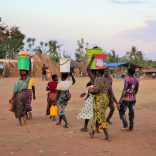
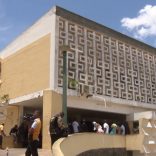

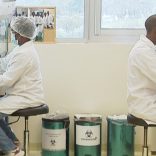

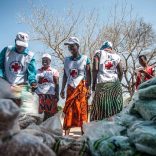





Leave a Reply
Be the First to Comment!
You must be logged in to post a comment.
You must be logged in to post a comment.